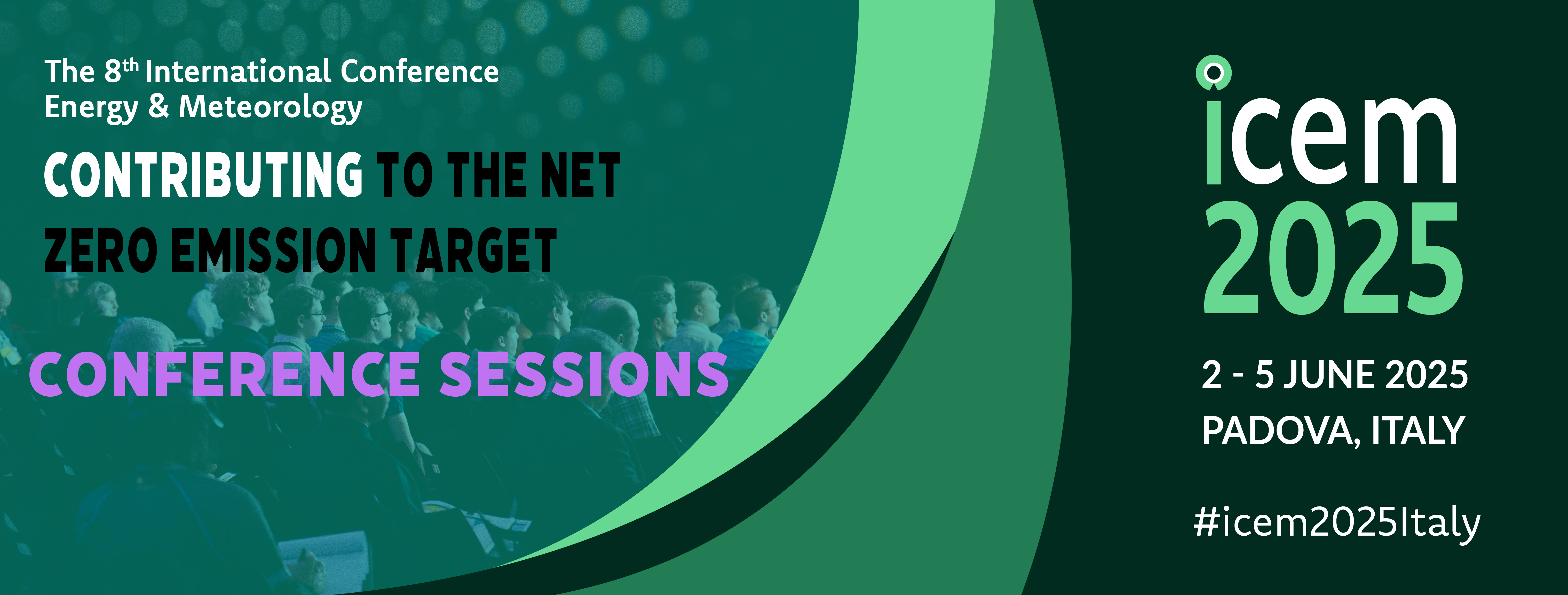
THE SESSIONS
1. AI in Weather and Climate for Energy
TOPICS
- AI for Renewable Energy Forecasting: Enhancing the accuracy of wind, solar, and hydropower forecasts using AI and machine learning tools.
- AI-Driven Weather and Climate Models: Applications of AI in improving short term weather and long-term climate models, aiding decision-making in the energy sector.
- AI in Energy Demand Prediction: Using AI to forecast energy demand under variable weather and climate conditions.
- AI and Weather-Resilient Energy Systems: AI’s role in optimizing energy systems to adapt to weather variability and extreme events.
- Ethics and Challenges of AI in Meteorology for Energy: Addressing data privacy, transparency, and AI’s limitations in energy applications.
2. Sustainable Energy Transition and Climate Resilience
- Climate-Informed Pathways to Net Zero: How climate data can help shape sustainable energy policies and pathways to achieving net zero emissions.
- Renewable Energy Integration: Meteorological applications for integrating wind, solar, and other renewables into the energy grid.
- Energy Storage and Meteorology: The role of climate and weather forecasts in optimizing energy storage solutions for renewables.
- Decarbonization and Extreme Weather Preparedness: Using weather and climate services to ensure the resilience of energy infrastructure in extreme weather scenarios.
- Climate Justice and Just Transitions: Ensuring equity and fairness in the global energy transition, with a focus on vulnerable communities affected by climate change.
- Policy and Financing for Renewable Energy Expansion: Frameworks and innovations in policy, financing, and public-private partnerships to drive the global transition to sustainable energy.
- Sectoral Decarbonization Strategies: Case studies on how sectors like transportation, heavy industry, and agriculture are transitioning to renewable energy.
3. Forecasting for Energy Planning and Operations
- Short-range to Medium-range Weather/Power Forecasting (including Use of Satellite Data, Instrumentation): Improving accuracy in energy forecasts through advanced satellite data, remote sensing, and ground-based instrumentation.
- Sub-seasonal to Decadal Forecasting for Energy: The role of extended-range weather forecasts in energy planning and operations.
- Probabilistic Forecasting for Energy Management: Using probabilistic methods to manage uncertainties in energy production and demand.
- Climate Forecasts for Long-term Energy Infrastructure Planning: Integrating climate projections into planning for renewable energy infrastructure.
- Bias Adjustment and Multi-model Forecasting: Techniques for improving the accuracy of energy forecasts using climate models and bias adjustments.
4. Energy Systems and Extreme Weather Risk Management
- Climate Change and Extreme Weather Impacts on Energy: Assessing the risks that hurricanes, droughts, floods, and heatwaves pose to energy systems.
- Resilience Strategies for Energy Infrastructure: Using meteorological data to build resilience in energy transmission and distribution systems.
- Energy Operations During Extreme Events: Best practices for managing energy operations during extreme weather events.
- Case Studies in Climate Risk Management: Real-world examples of how energy systems have adapted to extreme weather and climate risks.
5. Weather and Climate Services for Energy
- The Socio-economic Value of Weather and Climate Services: How these services contribute to more efficient energy systems and investment decisions.
- Frameworks for Delivering Climate Services to Energy Sectors: Best practices for implementing weather and climate services, including collaboration with stakeholders.
- Customizing Climate Services for Energy: Case studies on co-designing climate services for specific energy sector needs (e.g., offshore wind, solar PV).
- Real-time Weather Data for Energy Efficiency: How real-time weather data is being used to improve energy efficiency in demand response systems.
6. Climate & Energy Modelling
- Climate Data and Energy System Analysis: Leveraging databases for energy systems modelling.
- Climate Stress Event Definition and Assessment: Identifying key stress events affecting energy production and demand.
- Climate-based Energy Conversion Models: Developing models that convert climate inputs into energy system outputs.
- Scenario Modelling for Energy Systems: Using climate scenarios to support long-term planning and risk assessment.
7. Environmental Impacts of Energy Systems
- Energy Systems and Local Climate Effects: Investigating how large-scale energy infrastructure, such as wind farms, affects local climates and weather patterns.
- Micrometeorology in Power Generation: Examining the localized impacts of energy systems on weather patterns (e.g., wind turbine wakes, solar heat islands).
- Social and Environmental Impacts of Renewable Energy Development: Addressing concerns such as biodiversity loss, land use, and community displacement.
- Assessing Life-cycle Impacts of Renewable Technologies: Exploring the environmental footprint of renewable technologies across their life cycles.
8. Energy Resource Management and Decentralization
- Decentralized Energy Systems and Microgrids: How decentralized energy systems are integrating weather forecasts to enhance resilience and energy access.
- Resource Optimization Using Weather Data: Managing energy resources like solar, wind, and hydro based on weather variability and demand forecasts.
- Energy Storage and Distributed Energy Systems: Using climate forecasts to optimize storage in decentralized systems (e.g., batteries, thermal storage).
- Weather Data for Energy Trading: Applications of real-time weather data in energy trading, including demand response and market strategies.
9. Policy, Cross-sectoral Issues, and the Energy-Water-Food Nexus
- Global Climate and Energy Policy: Understanding the intersection of international climate agreements (Paris Agreement, Net Zero targets) and energy sector reforms.
- Energy-Water-Food Nexus and Climate Resilience: Exploring the interdependence of water resources, food and energy production, with a focus on mitigating water shortages and droughts.
- The Role of Weather and Climate Data in Energy Policy: How governments and institutions are integrating climate data into their policy frameworks for achieving net zero.
- Collaborations Across Sectors: Case studies of cross-sectoral collaborations (e.g., energy, agriculture, transport) that are using climate data to advance decarbonization goals.
10. Education and Training Programmes in Energy and Meteorology
- Capacity Building Initiatives: Discussion of master’s programs, summer schools, and specialized training aimed at preparing the next generation of energy and climate professionals.
- Outreach to Schools and Communities: Programs designed to engage younger audiences and promote awareness of meteorology’s role in renewable energy and climate change mitigation.
- Training for End-users of Climate and Energy Services: Developing visual, interactive, and user-friendly tools for decision-makers, energy providers, and other stakeholders.
- Effective Communication of Meteorological Data in the Energy Industry: Best practices for translating complex meteorological data into actionable insights for energy professionals.
- Innovative Educational Technologies: Leveraging e-learning, simulations, and virtual platforms to make climate and energy education accessible globally.
- Public Engagement in Climate and Energy Literacy: Methods for raising public awareness on climate impacts and sustainable energy practices through accessible communication strategies.

